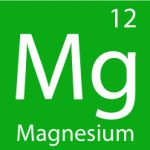Magnesium supplementation on top of a balanced healthy diet is common these days as magnesium deficiency becomes more widespread throughout the community. We are usually unable to gain the required daily amount of magnesium through diet alone so supplements are often recommended.
The advised levels for magnesium intake are 320mg for women and 420mg for men (NIH).
 A diet high in refined sugar, carbonated beverages, stress, high alcohol intake or chronic disease deplete our body’s stored magnesium too quickly which puts you at higher risk for deficiency. Click here for the full list of magnesium deficiency risk factors.
A diet high in refined sugar, carbonated beverages, stress, high alcohol intake or chronic disease deplete our body’s stored magnesium too quickly which puts you at higher risk for deficiency. Click here for the full list of magnesium deficiency risk factors.
The human body is unable to make it’s own magnesium so the only input we get is what we administer ourselves through the ingestion of magnesium rich foods or different sorts of magnesium supplements.
Without magnesium, your musculo-skeletal, cardiovascular, nervous and digestive systems are unable to function to their optimum levels so some serious health conditions can ensue.
The positive side effects of magnesium supplements when used correctly with a balanced diet containing sufficient amounts of magnesium rich food are many and varied.
Side Effects of Magnesium Supplements on the Musculo-Skeletal System

The musculo-skeletal system basically means your muscles and bones. Magnesium works at the cellular level to enable the muscles to contract and, more importantly to relax as normal. With magnesium deficiency you notice muscle cramping as a classic symptom. Magnesium supplements help to prevent cramps by relaxing the muscles.
When you are suffering from stress and muscular tension, magnesium also helps to relax you. The use of topical magnesium chloride oil or lotion directly on your muscles, or magnesium chloride flakes or magnesium sulphate salts (epsom salts) as a magnesium soak are especially effective forms of magnesium supplements for muscle relaxation.

Magnesium supplements also allow us to create enough of the energy molecule ATP which leads to the prevention of muscle fatigue.
In the skeleton, good amounts of magnesium promotes bone strengthening and new bone growth by supporting the efforts of osteoblasts and osteoclasts which are the cells that are the building blocks of bones. In this way magnesium supplements help to prevent conditions of bone degeneration especially osteoporosis.
Calcium supplementation is often recommended for bone health, but, without sufficient complementary magnesium, calcium can cause more problems than it solves. Enough magnesium is needed so you don’t end up with calcium deposits in your kidneys, bladder, gall bladder, or arteries as it doesn’t allow excess calcium to accumulate.
Side Effects of Magnesium Supplements on the Cardiovascular System
The cardiovascular system encompasses your heart, lungs and blood vessels. This is the powerhouse of your body and probably the most important system for stabilising life. Magnesium works to relax your muscles as above, so in this way too is the heart protected.
The heart is our most important muscle and magnesium works the same way here by relaxing the muscle cells as they contract thereby maintaining a regular heart beat.
This relaxant effect also works on the smooth muscles of the blood vessel walls and causes vasodilation which is the widening and relaxing of the vessels. High blood pressure is caused by calcium or fatty deposits or narrowing of the arteries so one of the best positive side effects of magnesium supplements is the lowering of blood pressure by decreasing the effort required by the heart to pump oxygenated blood around the body.
Again, ATP is needed for each beat of the heart which is produced by magnesium as well. And too much calcium is balanced out by enough magnesium to prevent muscle cramps and cellular death in the heart (heart attack or myocardial infarction).
Side Effects of Magnesium Supplements on the Nervous System
 Magnesium reduces anxiety and helps with sleep disorders as well as decreasing nervous tics. The nervous system is adversely
Magnesium reduces anxiety and helps with sleep disorders as well as decreasing nervous tics. The nervous system is adversely
affected when there is electrolyte imbalance and magnesium helps keep this in check by opening the channels for calcium, sodium, magnesium and potassium to pass back and forth and maintain their balance. In doing so, adequate magnesium also smooths the pathways for electrical impulses and nervous system response.
The awesome side effects of magnesium on neurological conditions include the reduction in incidence of depression and anxiety, and better sleep.
Side Effects of Magnesium Supplements on the Digestive System

Magnesium is responsible for supporting the enzymes utilised in literally thousands of enzymatic functions. These are the enzymes that break down the proteins, sugars, fats, carbohydrates, vitamins and minerals that we eat into useable molecules. One of the most important of these jobs is the breaking down of carbs and sugar into useable energy or adenosine-tri-phosphate (ATP).
Magnesium supplements can also reduce constipation with small doses of magnesium citrate. As this is often used in a powder form, a great way to reduce constipation is to spread out the recommended dose out over 12 hours to provide only gentle laxation. Also, excess magnesium is excreted and eliminated via the stool so the body uses this system to regulate your intake.
Negative Side Effects of Magnesium Supplements on the Digestive System
 It is in the digestive system that you will find the only negative effects of magnesium on the body. Magnesium citrate has a laxative effect as it has a unique ability to draw fluid into the bowel and induce diarrhoea. This can become a positive if you are looking to cure a problem with constipation.
It is in the digestive system that you will find the only negative effects of magnesium on the body. Magnesium citrate has a laxative effect as it has a unique ability to draw fluid into the bowel and induce diarrhoea. This can become a positive if you are looking to cure a problem with constipation.
Magnesium chloride, when taken orally, also has a possibility to cause nausea on sensitive stomachs. Magnesium chloride is commonly found as an oil or lotion which can be applied and absorbed directly through the skin thereby bypassing the digestive system and eliminating these side effects.
Hypermagnesemia or too much magnesium is a condition where there is too much magnesium in the blood. It is very rare and only occurs in people with chronic health conditions especially kidney disease because the excess magnesium is usually flushed out by the kidneys adequately.
People suffering from kidney disease should consult a physician before commencing on any kind of supplements.
For 75% of Americans, magnesium deficiency may be a real problem. Magnesium supplementation as a complementary therapy to a balanced diet high in nutrients has plenty of positive side effects which makes it a great way to provide the recommended daily amount and avoid serious ongoing health problems.
Have a look at the best magnesium supplements here to find one to suit your needs today!
Please comment below with your experiences or questions about magnesium supplements.



Permalink //
I have been looking for natural supplements to help with my difficulties sleeping as well as my anxiety. I have started reading more and more about how magnesium supplements can help with this.
Do yo have any information about when it is best to take a supplement to help with my sleep? I assume before bed would be ideal?
Permalink //
Hi Simone,
Magnesium is known for decreasing the hormone cortisol which is the stress hormone and allowing the increase of the hormone serotonin which is a feel good hormone. Along with it’s muscle relaxation properties, this combines to make you feel safe and happy and comfortable in your bed and able to get a better sleep.
I would recommend using a transdermal application of magnesium for maximum absorbency just before bed to improve your sleep. Transdermal oil such as Ancient Minerals Magnesium Oil is great to spray on and massage directly into your arms, legs, feet, hands and torso. Or else try an epsom salt bath just before bed for great relaxant effect.
Let me know how you go!
Regards, Kristine G
Permalink //
Thanks Kristine I will take a look at the Ancient Minerals Magnesium Oil. The link didn’t work though.
Permalink //
The information here is terrific. I found it really informative.
I’ve been wondering if I get enough magnesium and wanted to know if there was any way you can know. Have you any idea?
My main way is either through Epsom Salts in the bath which I particularly like if for some reason my muscles are sore. Works like a charm. I usually add Baking Soda as well.
I also have some mag oil which I spray on (you know, when I don’t have a bath)… trouble is I forget about it half the time! Reading this reminded me.
Do you know if there are good and bad magnesium supplements? Like… is Epsom Salts and the mag oil sufficient or am I missing out big time?
Permalink //
Hi Marilyn,
The fact that you are already aware of magnesium is excellent to hear.
The magnesium oil which you mentioned is usually Magnesium Chloride and has great bioavailability. Try and make its use part of your routine, such as rubbing it onto your arms, legs and torso just before bed. This will help you relax and sleep very well.
The epsom salts has a great effectiveness on sore muscles and for detoxing as the magnesium sulfate really draws the toxins out of your pores.
Otherwise there is Magnesium Citrate which is effective for relieving constipation, and Magnesium Gluconate which is great for those severely lacking in magnesium which has the highest bioavailability of them all.
Click on the links herein for more details.
Regards, Kristine G
Permalink //
I had absolutely no idea magnesium was so important! It sounds like it would help me out a lot, I’m quite often stressed and quite often get muscle cramps! I have no idea how much magnesium I get from my food, i imagine not a lot!I will go through your site to find some better foods I could include in my diet!
Permalink //
Hi Nick,
I recommend you have a look at my Magnesium Rich Foods Chart here which will give you an idea how much of the required 420mg of magnesium daily you are actually getting from your diet.
Another great source is the National Institute of Health.
I hope this helps!
Permalink //
I was a little confused at first. Side effects are generally associated with negative outcomes. I think I get enough magnesium. I take Spirutein as a protein supplement, but it has a healthy dose of magnesium as well. I think its the right amount, I’ve never had a problem with the ‘runs’ .
Permalink //
That’s great Dave!
Thanks for sharing!